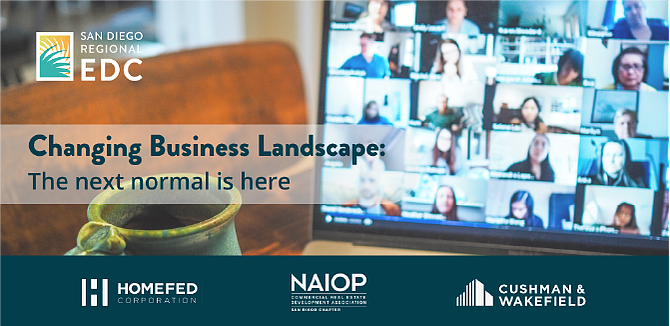The COVID-19 pandemic has impacted every facet of life, including how businesses operate. The San Diego region began the year with near-record high unemployment and widespread small business closures. Meanwhile, large companies across the globe have extended remote work well into 2021 and are even abandoning their corporate campuses. Companies in every industry are rapidly re-evaluating how they do business and changing the way they interact with customers, manage supply chains and where their employees are physically located. This has massive immediate and long-term implications for San Diego’s workforce and job composition, as well as regional land use decisions and infrastructure investment.
To identify evolving trends in local business needs and operations, ensuring their ability to grow and thrive in the region, San Diego Regional EDC began surveying more than 200 employers in the region’s key industries in January. Given the uncertainty of this moment in history, EDC will continue to survey these companies on a rolling basis throughout 2021 to monitor and report out shifts in their priorities and strategies. These insights will help inform long-term economic development priorities around talent recruitment and retention, quality job creation and infrastructure development. Businesses are surveyed on several topics, with varying emphases in each wave. This first wave, which included nearly 200 respondents, focused on talent attraction and retention and the changing workforce needs due to the pandemic. Here are three key findings:
Everything is different, yet the future is bright. The pandemic has fundamentally altered how businesses operate across key industries. However, most companies are optimistic about their ability to pivot and emerge even stronger.
Remote working is no longer a perk or competitive advantage—it’s the standard. Most companies view remote working as here to stay. This is viewed as both a benefit and as a threat to employee retention.
Long commutes have been replaced by a blurring of work-life boundaries. Companies are struggling in maintaining employee morale and engagement. While many are seeing signs of employee burnout and isolation, few report significant concerns with retention.
San Diego’s Innovation Cluster Rises to Meet the Challenge
One year into a global pandemic, San Diego’s most innovative companies and industries are well on their way to economic recovery. In fact, high-wage jobs—many of which are concentrated in aerospace, life science, and technology industries—have more than recovered from the pandemic-driven recession. This is welcome news as these are key drivers of economic growth in the region. In fact, every “innovation” job supports another two jobs elsewhere in the economy.
Even though growth has returned to the innovation cluster, the pandemic has disrupted the way these companies operate. The overwhelming majority (83 percent) of companies surveyed agree that pandemic has fundamentally altered their industry. Yet, nearly as many (81 percent) feel that their industry has been able to adjust and remain healthy. Even more encouraging, 87 percent believe their industry will emerge even stronger once the pandemic has ended after adopting new ideas and implementing new strategies. However, those in the aerospace industry expressed somewhat lower levels of optimism, as the industry faces continued uncertainty around travel safety and demand.
Confidence was somewhat lower among smaller firms. Only 77 percent of those with fewer than 50 employees agreed that their industry would emerge stronger and 10 percent strongly disagreed. This likely reflects the disproportionate impact that the pandemic has had on small businesses, regardless of industry. While those in leisure and hospitality have certainly been the hardest hit, even small firms in professional and business services, including scientific and technical services, are currently experiencing lower revenues compared to before the pandemic.
Yet the strongest signal for optimism comes from the direct response in combatting the novel coronavirus. San Diego companies have been among those leading the fight in everything from personal protective equipment and diagnostics to therapeutics and vaccine development. The life-changing and life-saving companies have pivoted and innovated yet again, drawing in record levels of venture capital investment. In the fourth quarter of 2020 alone, the region received nearly $2.7 billion in venture funding—with almost three-quarters going to life sciences and healthcare companies—which is more than three previous quarters combined and $2 billion more than Q4 2019. The surge in investment and jobs recovery has the majority of innovation companies confident the region’s ability to grow in prominence or remain steadfast as a global leader in tech and life sciences.
The War for Talent Has no Bounds
Talent has always been San Diego’s competitive advantage. People come from all over the world to get educated and build meaningful careers in everything from software engineering and autonomous vehicles to genomics sequencing and cybersecurity. San Diego’s innovation industries are among the highest-paying and fastest-growing in the region. Despite a global pandemic, many of these industries are accelerating hiring. The information sector, including telecommunications and information technology services, posted 20 percent more unique job ads in December 2020 than the year prior.
However, top talent remains hard to find. And while many of the jobs in these industries have shifted to either partially or fully remote, there are mixed feelings about whether it is a benefit or a detriment to talent recruitment and retention. Perceptions are tied to a company’s approach to attracting remote talent. On one hand, a majority of respondents think that their ability to hire and retain skilled talent will not be impacted because of the pandemic because of remote work capabilities. Many have expanded their recruitment beyond San Diego’s borders and are willing to accommodate working from outside the region to retain the very best talent. These San Diego-based companies view the world as their pool for talent are embracing a global workforce that can get the job done from anywhere.
Yet, there is also a large minority of companies that view the pandemic as impacting the way they hire and retain talent. Again, the shift to remote work is cited as the top reason, with an even larger proportion (35 percent) identifying it as the cause for their pessimism. In fact, 45 percent of survey respondents rate hiring new employees during the pandemic as either “difficult” or “more difficult” than before, compared to 18 percent who view it as “easier” or “much easier.” Furthermore, nearly half of respondents cited talent recruitment as an area needing assistance and 20 percent identified it as an “urgent need.”
The pandemic has leveled the playing field for markets aiming to attract the best and brightest knowledge workers. San Diego’s competition with companies and regions across the country has increased. The region’s high cost of living is by far the biggest impediment to talent attraction, with 44 percent of respondents identifying high home prices as the most negative attribute of the San Diego market.
This is due in large part to housing production not keeping pace with employment growth. As a result, San Diego has the second highest median home price among the 25 largest metros in the U.S., behind only San Francisco, and home prices jumped another 11 percent in 2020. Ensuring San Diego is an attractive and affordable place for talent and business is critical to maintaining its regional competitiveness.
Responding to Workers’ Needs is Top of Mind for Companies
Transitioning to a remote work environment has been challenging. Business leaders are acutely aware of the need to balance conducting business as usual while responding to the changing needs of a newly remote workforce. Survey respondents report signs of ‘zoom fatigue,’ blurred work-life boundaries and isolation among employees. While it has not yet significantly impacted retention, a full 60 percent of respondents rated “maintaining employee morale” as more challenging during the pandemic.
Furthermore, respondents expressed concerns about returning to an in-person work environment, recognizing that not all employees will want to return to the office immediately or full-time. This next phase of work will bring about a new set of challenges and a need for new policies, systems and support for San Diego workers. Many questions remain around how much space will be needed and how it might need to be reconfigured to accommodate a flexible work environment that is also responsive to new health and safety requirements.
Survey respondents rated individualistic factors related to professional growth and work-life balance as the most important attributes to a competitive market for talent attraction and retention. This differs greatly from perceptions from just four years ago, when top universities and an entrepreneurial spirit were more top of mind. The desire to adapt and respond to the most pressing needs of its workforce, reinforces the notion that San Diego businesses value talent above all else.
Stay tuned for more on San Diego’s changing business landscape. EDC will be back every other month with more trends and insights. For more data and analysis visit: sandiegobusiness.org/research.
Fill out the survey here: survey.alchemer.com/s3/6231097/San-Diego-Business-Landscape

